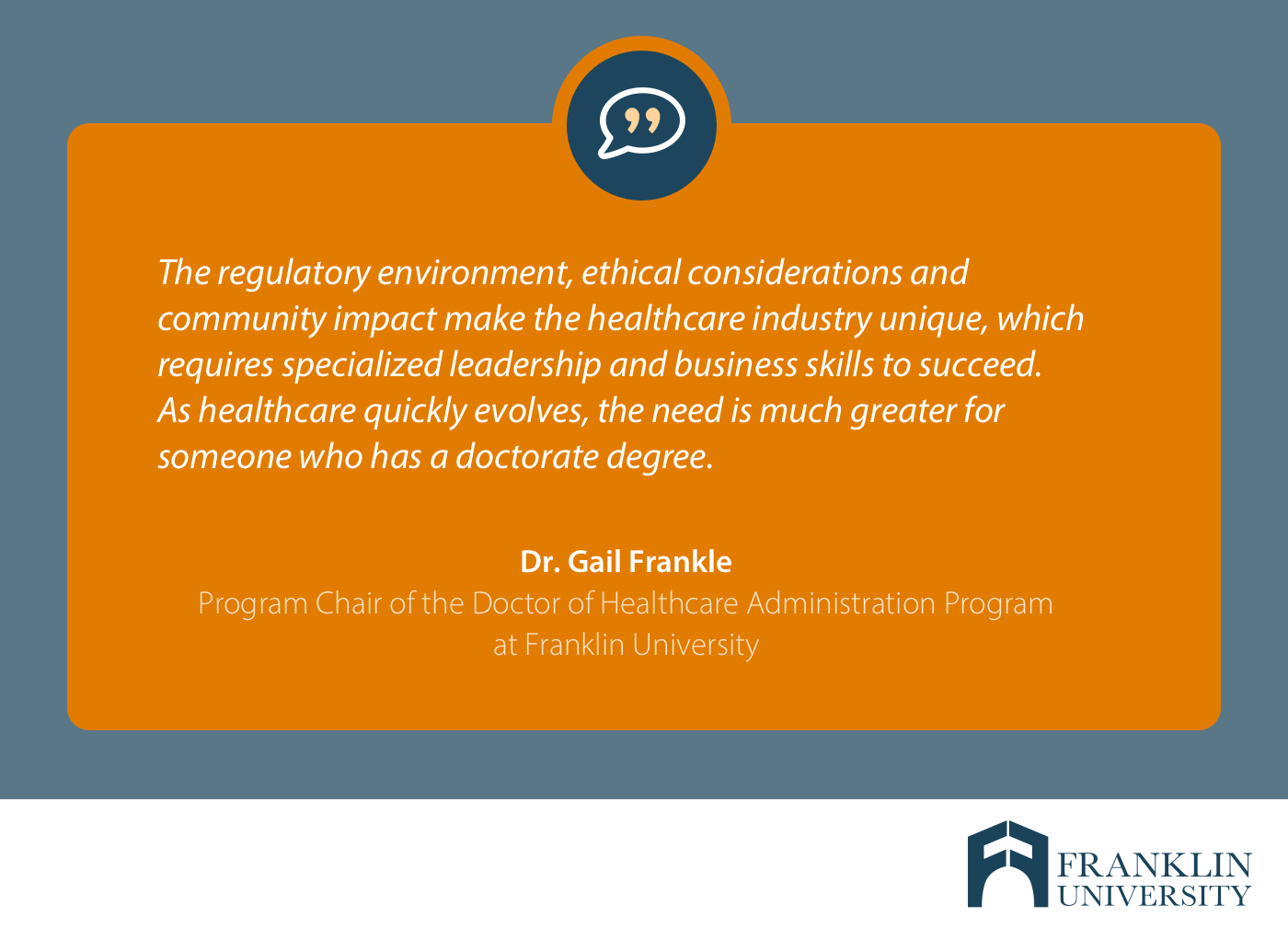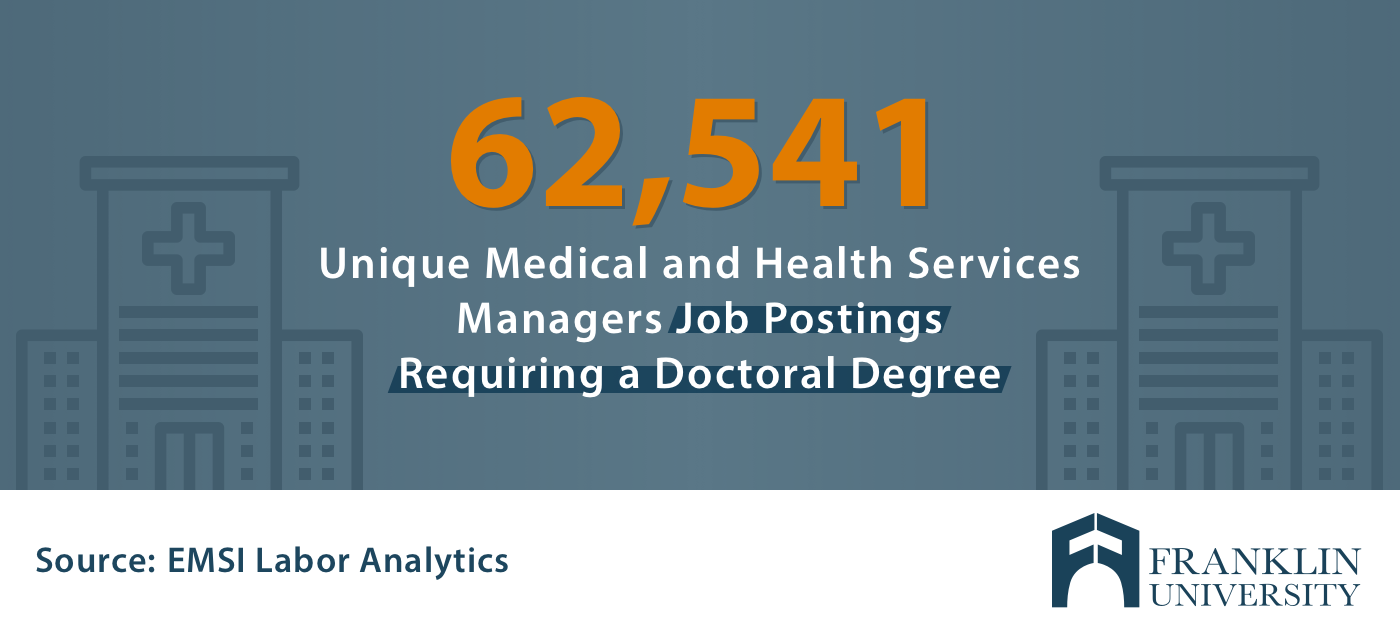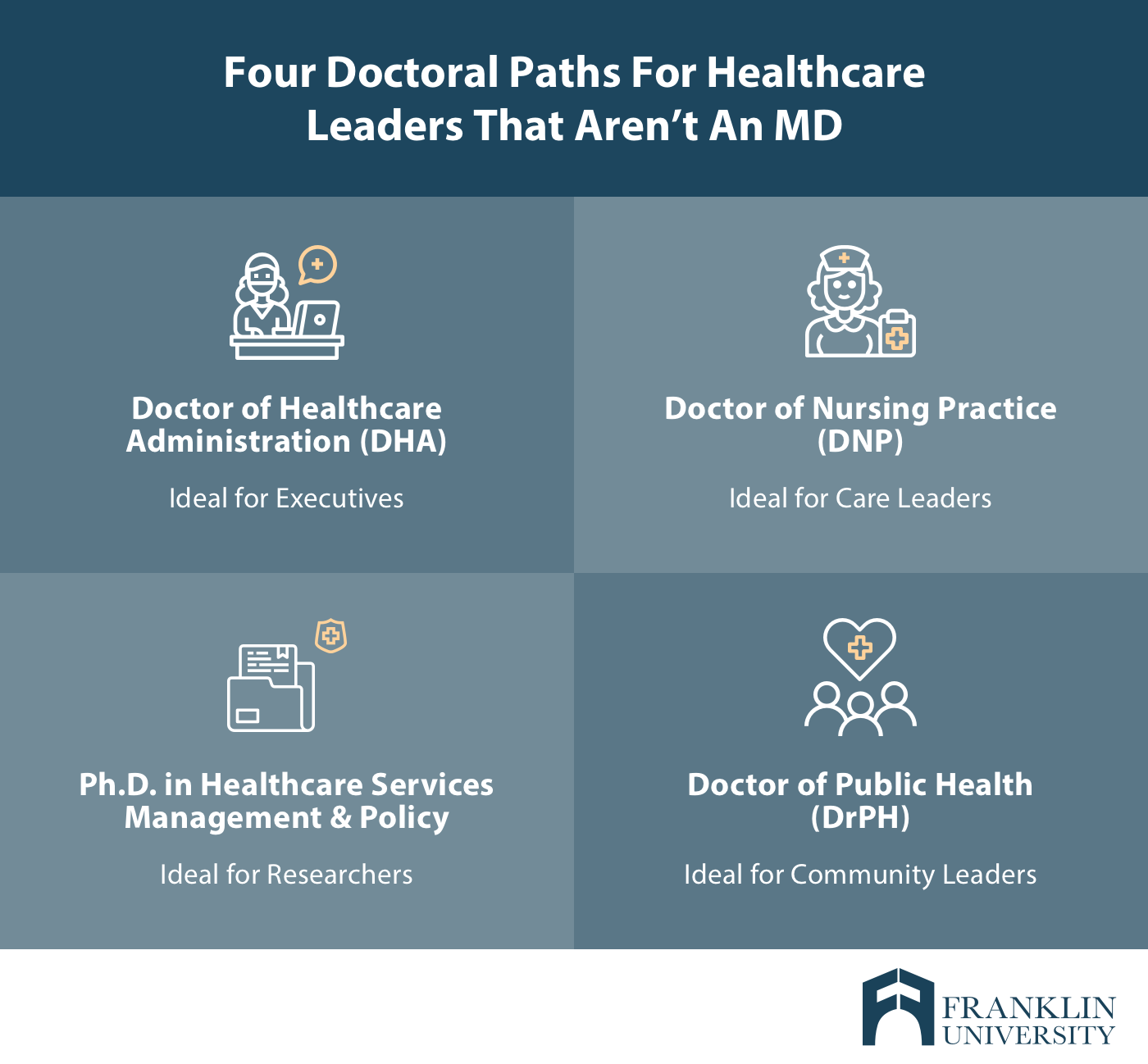Request Information
We're Sorry
There was an unexpected error with the form (your web browser was unable to retrieve some required data from our servers). This kind of error may occur if you have temporarily lost your internet connection. If you're able to verify that your internet connection is stable and the error persists, the Franklin University Help Desk is available to assist you at helpdesk@franklin.edu, 614.947.6682 (local), or 1.866.435.7006 (toll free).
Just a moment while we process your submission.

Doctorate Degrees In Healthcare: Becoming a Healthcare Leader
When you think of healthcare doctorates, a Doctor of Medicine is probably the first degree that comes to mind. Yet, in today’s complex and evolving healthcare industry, an MD isn’t the only way to create a thriving career in healthcare.
A doctoral degree is becoming the in-demand credential for healthcare leaders across a variety of organizations and specialties. To meet this demand, there are multiple doctoral education paths you can pursue. Let’s look at the different types of doctoral-level healthcare degree programs and how they can help you achieve your goals of becoming a healthcare leader.
The Demand for Healthcare Leaders

When considering doctorates, you want to ensure you’re making a solid investment in your future. Healthcare, as an essential service, provides long-term job stability. The healthcare industry is also benefiting from changing demographics and accelerating technological advancement, which positions the industry for extensive growth.
As the industry evolves, it will need highly qualified leaders in both clinical and administrative roles to navigate change, advance business success and improve patient outcomes.
The demand for medical and health services managers is particularly noteworthy—projected to grow by 32% by 2029. The medical and health services manager job category encompasses many leadership roles in both clinical and administrative settings.
Let’s look at leading doctoral degrees that can help you capture this momentum and advance your career.
Doctorates for Non-Clinical Healthcare Leaders

Healthcare administrators make up a large portion of non-clinical careers in healthcare. These professionals direct the operation of hospitals, health systems and other types of healthcare organizations. Depending on the size and type of organization, they may work within specialized departments or oversee operations as a whole.
According to leading labor market analytics firm EMSI, from June 2020 to June 2021, 62,541 unique positions were posted for medical and health services managers that required a doctoral degree. Even if a role doesn’t require a doctorate in healthcare, it can be a major differentiating factor in a competitive job market.
Let’s look at the doctorates in healthcare that are the best fit for those interested in non-clinical leadership positions.
Advance your career in Healthcare Administration while you advance patient care. Download your free career guide.

Doctor of Healthcare Administration (DHA)
The Doctor of Healthcare Administration (DHA) is a professional doctorate that focuses on putting theory and research into practice. It’s perhaps the most versatile doctorate degree for aspiring non-clinical healthcare leaders. Today’s healthcare administration leaders are taking on a dual role as an innovator and educator, bringing forth new ideas for policy, practice and patient improvements.
This degree is ideal for aspiring healthcare leaders who want to pioneer change to propel the healthcare system forward. Whether on the ground in healthcare organizations or in the classroom training next-generation leaders, a DHA will prepare you with the research, communication and expanded technical capabilities to solve real-world healthcare challenges.
Popular career paths for graduates:
- Hospital chief executive
- Nursing home administrator
- Healthcare consultant
- Health system director
- Full-time or part-time faculty
Ph.D. in Healthcare Services Management and Policy
A Ph.D. in Healthcare Services Management and Policy is an academic degree focused on furthering scholarly research in the healthcare administration and policy field. A Ph.D. program in this field includes research in areas like healthcare management, health policy analysis, health services, quality-of-care measurement and improvement.
This degree is ideal for aspiring healthcare scholars. Many Ph.D. graduates will work in academia or public policy, conducting original research and writing peer-reviewed studies to help advance the field.
Popular career paths for graduates:
- University faculty
- Health policy researcher
- Epidemiologist
- Healthcare agency director
- Health services consultant
Doctoral Degrees for Clinical & Community Healthcare Leaders
Clinical and community healthcare leaders work directly with patients, study patient populations and consider the societal impacts of healthcare delivery. Popular career paths in clinical and community health at the doctoral level are in patient care, healthcare education and public health. Advanced education is typically a requirement for these positions.
Let’s look at two different doctorates that are popular in this sector of healthcare.
Doctor of Nursing Practice (DNP)
The Doctor of Nursing Practice (DNP) degree is a versatile professional doctorate for nurses. It may even become a requirement for advanced practice nursing roles in the near future. A DNP program will prepare you to help the field evolve for the betterment of safe, efficient and high-value care using principles of evidence-based practice.
This degree is ideal for nurses who want an advanced practice nursing role as a primary care provider or clinical administrative leader. As a nurse with a DNP, you will be able to help close the gap between research and practice, helping to improve patient care and outcomes.
Popular career paths for DNP graduates:
- Chief Nursing Officer
- Nursing policymaker
- Nursing administrator
- Clinical leader
- Clinical instructor
Doctor of Public Health (DrPH)
A Doctor of Public Health (DrPH) is a professional doctorate that specializes in the societal impact of healthcare delivery, policies and regulations. This degree can help you advance your skills in fields like epidemiology, biostatistics, community and environmental health and more.
This degree is ideal for healthcare leaders who want to fuel positive change in the health and wellness of communities. Many DrPH graduates work in the government and nonprofit sectors, working to improve public health by developing and implementing healthcare programs and policies.
Popular career paths for DrPH graduates:
- Health officer
- Public health consultant
- Health policy analyst
- Health department director
- Community health manager
Choosing the Right Healthcare Doctorate For You
Earning a doctorate in healthcare is a lifetime achievement and will prepare you to join an elite class of healthcare leaders. Choosing the right doctoral program can set you on the path to a flourishing career in a thriving healthcare industry. To find the right program, you will need to consider your personal career aspirations, preferred academic setting and program structure that will empower you to succeed.
Franklin University offers two terminal healthcare degrees: the Doctor of Healthcare Administration (DHA) and the Doctor of Nursing Practice (DNP). Franklin University works one-on-one with prospective doctoral students to find the right healthcare degree for their needs.
Through generous transfer-credit policies, online programs and a no-fear, integrated dissertation process, Franklin’s DHA degree helps working professionals succeed at the doctoral level.
The DNP degree offers 100% online coursework, built-in practicum hours and opportunities to customize the degree by choosing between a leadership or FNP track.
Explore our healthcare doctorate programs can help you achieve your administrative or clinical leadership goals.





